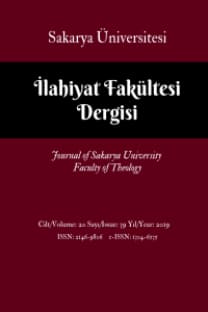HANEFÎ HADİS ANLAYIŞININ FETHU’L-KADÎR’E YANSIMALARI VE İBNÜ’L-HÜMÂM’IN TERCİHLER
Hanefî hadis anlayışının, hicrî dokuzuncu asırda yazılmış bir fıkıh eseri olan Fethu’l-kadîr’e yansımaları ve müellifinin hadisleri kullanımındaki tutumunu tesbit makalenin amacıdır. Makalede Fıkıh Usulü ve Kelam alanında ilim dünyasında adından söz edilen İbnü'l-Hümâm’ın çok sayıda hadisi delil olarak kullandığı Fethu’lkadîr isimli eserinde Hanefî hadis anlayışının yansımalarına dair örnekler sunulmuştur. Çalışmada Hanefî usûlünün tüm prensipleri yerine diğer ekollerden farklı olarak dikkati çeken bazı temel prensipleri üzerinde tespitler yapılmıştır. Bu bağlamda hadislerin Kur’ân’a arzı, mürsel hadisin sıhhat değeri, nesih gibi konuların uygulamaya yansıması ile müellifin bu konulardaki tercihi ortaya konmaya çalışılmıştır.
Anahtar Kelimeler:
Hanefî, Hadis Usulü, İbnü'l-Hümam, Fethu'l-kadîr
The Reflections of Understanding of Hadith in the Hanafi School of Law on Fath al-Qadir and Ibn al-Humam’s Preferences
This article aims to reflect understanding of Hadith in the Hanafi School of Law on Fath al-Qadir which is a commentary book related to al-Fiqh written in the ninth century of the hegira and ascertain its author’s position on using Hadith as evidence. It focuses on the work called Fath al-Qadir whose author is Ibn al-Humam of Turkish origin, mentioned most often in the field Hanafi Legal Theory and the science of Kalam, adduced a large number of Hadith as evidence and gives examples reflecting the understanding of Hadith of Hanafi School of Law. In stead of all the issues of Hanafi Legal Theory, the article examines some discussions differ from other schools such as ard (applying Hadith to the Qur'an), worth of mursal Hadith, naskh (abrogation) and tries to determine Ibn al-Humam’s preferences for these discussions in his work.
Keywords:
Hanafi, Methodology of Hadith, Ibn al-Humam, Fath al-Qadir,
- ISSN: 2146-9806
- Yayın Aralığı: Yılda 2 Sayı
- Başlangıç: 2001
- Yayıncı: Sakarya Üniversitesi
Sayıdaki Diğer Makaleler
İslam Hukuk Felsefesi: Kaynaklar, Yöntemler, Amaçlar, Allâl el-Fâsî
Yeni Türk Şiirinde Cami ve Ezan, Zülfikar Güngör
ŞİÎ-USÛLÎ DÜŞÜNCENİN ORTAYA ÇIKIŞ SEBEPLERİ ÜZERİNE MÜLAHAZALAR
İSLÂM’DA KADININ KONUMUNA MODERN YAKLAŞIMLAR -MÛSÂ CÂRULLAH ÖRNEĞİ-
İNSAN KONULU SÖZCÜKLER BAĞLAMINDA FASİH ARAPÇA VE MISIR LEHÇESİ BİR KARŞILAŞTIRMA DENEMESİ
FIKIH TARİHİ BAĞLAMINDA OSMANLI TECRÜBESİNİ DOĞRU ANLAMAK
HANEFÎ HADİS ANLAYIŞININ FETHU’L-KADÎR’E YANSIMALARI VE İBNÜ’L-HÜMÂM’IN TERCİHLER
ARİSTOTELES'TE EN YÜKSEK ENTELEKTÜEL ERDEM
